#planescape npc
Explore tagged Tumblr posts
Text
every rpg maker ever: what if... get this, it'll blow your mind... we had a brothel in our game. I'm a genius. $5000000 please
#enjoying Planescape Torment a lot so far aside from all the 'Harlot' NPCs I'm encountering#I'm not joking when I say this occurs in basically every RPG I've ever played#no KotOR 1 I do not actually want to force a Twi'lek slave to give my character a massage why on earth would I want that#video games and objectifying women. name a more iconic duo#Ranger's gaming adventures
32 notes
·
View notes
Text
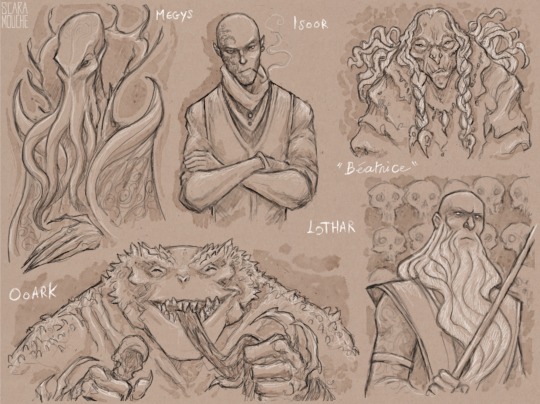
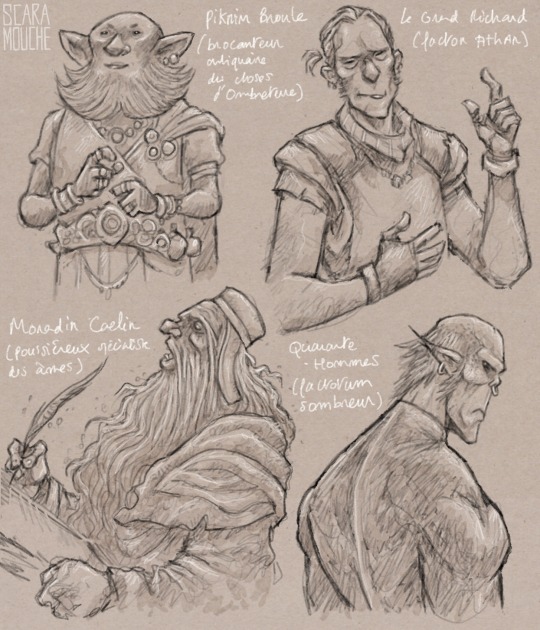
Qezra and Izaark met some nice dudes during their quest.
27 notes
·
View notes
Text

This is an NPC for my DnD table playing the Turn of Fortune's Wheel module in the Planescape setting. There's an encounter where they encounter three faction members, discussing the meaning of the multiverse, but it provides no visual for these people. So I drew one and came up with backstory. _______
Gracie was born a human in Sigil, city of doors, when a portal is opened in her neighborhood, directly connected to the Blood Wars taking place in the hells. Gracie, along with many other civilians were captured and dragged into the hells before the portals were able to be closed.
Time behaves differently when being tortured in the hells. While Gracie and the other captives spent years and years being experimented on, tortured, and used for rituals, they did not age, and they could not die. It would be over a decade before a party of adventurers made their way down to the hells to liberate the captives, returning them back to Sigil. However, Gracie returned with monstrous deformations. Her cranium was more horns than not, her eyes a constant fountain of blood, her limbs bent, broken, and reset into unnatural positions.
The Bleak Cabal is a faction in Sigil who believe that the universe has no meaning, only that which an individual finds for themselves. Most of it's factions find meaning in helping those afflicted with extraplanar ailments and curses, so they had the halls of their gatehouse filled to the brim after the liberation of the captives. Most of these patients were too far gone for saving, some even electing to be put out of their suffering. Gracie, deemed by the Cabal's experts, was the worst case that they were able to bring back to normalcy.
It took months of enchantments and procedures, removing horns, correcting bones, to return Gracie to a humanoid form, though she was different from before. Her freckled and sun kissed face had assumed a pallid sheet white color. Her once silky copper hair became wiry, thick, and jet black. Her rounded ears held a sharp point. Her ocean blue eyes still held the flames of the Nine Hells, taking on a red hue.
Even once Gracie was physically healed, the mental scars carried with her. She would come to discover that her parents, already elderly prior to the portal's opening, had passed away during her time in captivity. With nothing left, and with new relationships forged with the members of the Cabal who had cared for her, Gracie made the decision to dedicate her life to the Bleak Cabal, specializing in demonic curses and how to dispel them.
_______
TL;DR: She's been through it but she's like fine now.
My players will more than likely ignore her and will never even see the art lol
#dnd#dungeons and dragons#oc#oc art#planescape#bleak cabal#sigil#short story#backstory#world building#npc
14 notes
·
View notes
Text
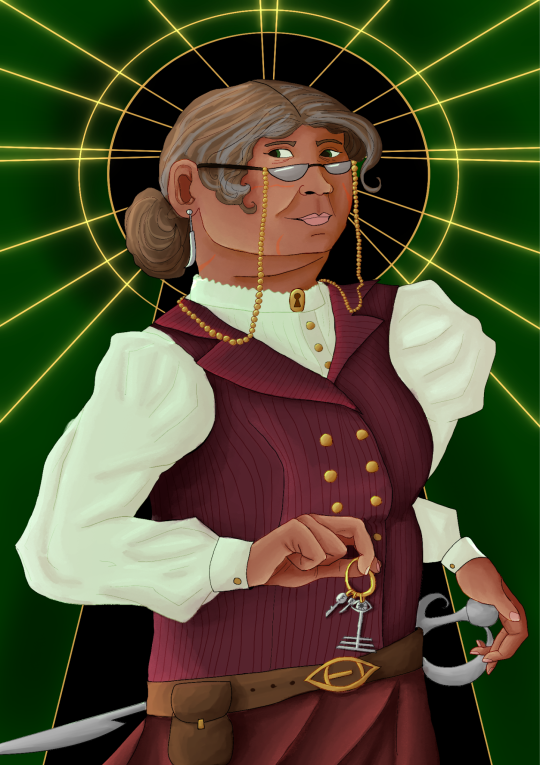
Annabelle Keay
An npc from my Planescape dnd campaign, magnificent bitch, and problem causer extrodinarrie. She's heavily inspired by Gertrude Robinson from the Magnus archives and she's got a sword from the Lady of Pain's Crown of Blades.
44 notes
·
View notes
Note
Got any NPCs with names that start with B?
What NPCs of yours would like raviolis?
I sure do!
Bean
Bean is a Rogue Monodrone who runs an upcycled clothing shop in the city of Sigil. My players love Bean. :)

I think lots of my NPCs would like raviolis! ravioli is delicious! I can see it perhaps being a popular dish in Ososea (Trita).
3 notes
·
View notes
Text

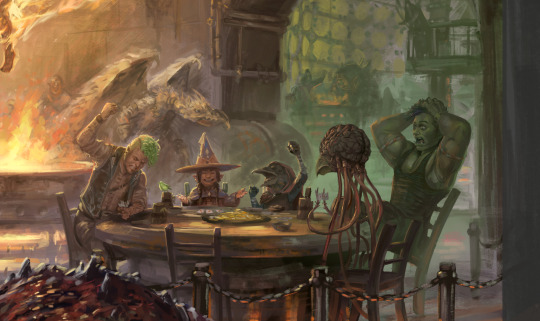
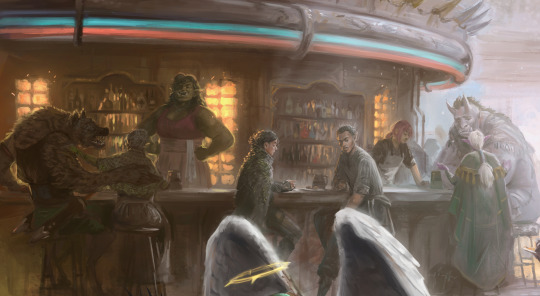
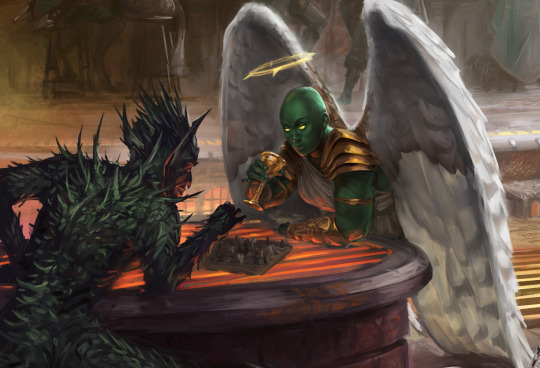
The 'Smoldering Corpse', a bar in the planar city of Sigil from D&D's upcoming 'Sigil and the Outlands' book (and originally from Planescape Torment)
Never have I painted so many NPCs in such a big scene, with so many little stories going on :D
#there's a grell playing poker#D&D#DnD#Dungeons and Dragons#Planescape#Wizards of the Coast#Ain't no way am I gonna tag all the different species in here#but if one of you wants to try go ahead
1K notes
·
View notes
Text
Cities in RPGs Poll
I'm sure many of you, like me, have encountered the following problem when playing an RPG: You get to a city, and all of a sudden, the pacing seems to slow to a crawl. You are bombarded with quests, NPCs, and places to visit, and are hit with an overwhelming sense of paralysis as you try and parse together what to do first, or at all.
So, I'm curious as to how the placement of such cities in the overall progression of the game affects this feeling. I would like to know which of the following options, in your opinion, is the most effective place to introduce a city in a game.
[Examples of each and propaganda below]
No Large Cities: This tends to spread the burden of quest hubs out to several smaller towns or locations. Pros - you avoid the above problem entirely (a.k.a. the coward's way out). Cons - big cities are cool, and this way you don't get to see any.
Early-Game City: Generally this approach dumps the player immediately into the largest city in the game after a short intro/tutorial section. Pros - reduces the above pacing drag by putting it right at the beginning. Cons - hard to make a city an exciting setpiece when it contains largely early-game content, plus you risk overwhelming the player very early.
Mid-Game City: This usually places the main city at around the 1/3rd mark of the game, after you've first been through a smaller quest hub, and when the story is starting to ramp up. Pros - balances the potential pacing drag with not overwhelming the player immediately. Cons - easy for players to get 'stuck' there and not know when it is time to move on to other areas.
Late-Game City: Here, the main city serves as more or less the final act of the game, and is generally where the main plot will be resolved. Pros - save the coolest location for last, cities make for good stakes to a conflict with so many potential innocent lives on the line. Cons - greatest chance of falling into the pacing trap, hard to either make players care about the side content with the stakes so elevated, or make them care about the main content with so much new side content to enjoy.
Game is Mostly City: Taking the opposite approach of the first option to achieve the same result, these games tend to pace their cities out in stages or change them over time rather than have every area accessible from the start. Pros - usually you get more depth out of the city this way, while bypassing the pacing problem. Cons - you don't get to see much *but* the city, and this can make the game feel smaller.
If you have another method not covered here, or further thoughts on the types above, be sure to rb/share in the tags as I would love to hear them!
#polls#my polls#game design#rpgs#crpg#video games#baldur's gate 3#dragon age#witcher#pillars of eternity#divinity: original sin#baldur's gate#planescape torment#skyrim#the elder scrolls#rpg polls
173 notes
·
View notes
Note
here is an ask that is a free excuse to talk about any disco elysium prowldome thoughts you have because i am FASCINATED by it in the abstract but having a hard time nailing it down
so your original tags on the post this relates to specified that CD is Kim (and therefore, Prowl is Harry) and that is what actually made me really interested. because not making the self-destructive amnesiac character CD (who in canon is... that in a different way) was SO interesting to me. i will cut this both for potential DE spoilers and also so people can choose whether or not to read my overlong ramblings. lmao.
so the thing about DE as a text is that it's doing a really specific thing gameplay wise, derived from the biggest inspiration it has mechanically, which is the game Planescape Torment. specifically it is doing this thing where the idea of the amnesiac protagonist as a 'clean slate' is troubled by constant catastrophic interaction with NPCs that knew your player character before they lost their memory, so while you as the player are roleplaying as them as vessels to project yourself onto because of their diagetic memory loss, you are constantly having that fantasy of 'starting over fresh' and total control over them as an agent undermined by the reality that other people remember them, and their influence on this fictional world pre-dates your own.
i think that's SUCH a fascinating lens through which to look at what Prowl does as a character; his constant attempts at- and more to the point failure at- reinvention, because the thing that constantly gets in his way is always... himself. his own past actions catching up to him and his inability to handle that. right? so he's an incredibly interesting kind of archetype to put into this story just because the thing that always undermines him is his inability to get away from his impact on other people. he can change how he feels or who he is, but he can't change what he's done. this is a really great character to put into a narrative role like Harry in DE.
the thing is that Chromedome is not Kim, because the entire point of Kim is to give you someone to make that new first impression on. right? Kim is the character from out of town who knows of you by reputation but has no pre-existing relationship to you as an actual person. who you decide to play Harry as in the moment becomes who Kim knows you to be.
if Chromedome is anyone, surely he's. you know. Harry's ex he keeps alienating by calling her and freaking her out begging her to come back because he thinks they're inevitable and he refuses to tolerate life without her. he's Dora, at least very loosely. (well. he could be Jean, i guess. but like. I do not give a fuck about Jean. sorry.)
so i was thinking this over and like... a DE version of these two where the twist is that you think Chromedome is Kim and this is how these two meet on a case and become (professional) partners, and in reality he's been lying since realising that Prowl has no memory and he is, in fact, the ex that Prowl's limbic system keeps dropping hints he's really fucked up over (and who he has lingering repressed guilt over the knowledge he did in some way fuck over)... i think that's how i see this working tbh. it's fascinating to imagine how Chromedome would like. respond to that. and what his motivations are- both what they start off as and where they end up depending on how things go, and what an amnesiac Prowl decides to do and how he chooses to conduct himself.
there are a lot of things that i think are completely inextricable from DE even in the context of vague wonderings about silly hypothetical fandom AUs. first off, DE is about politics, and the kind of person Harry becomes in the face of his amnesia is tied extremely closely to that. fandom tends to gloss over the fact that a ton of Prowl's negative development in exRiD specifically is also linked to that comic making some points about politics, i feel; it's not that they're subtle or anything lmao, fandom just tends to focus on characters in a very individualist sense that doesn't always line up with what that comic is using them for. Prowl is someone who refuses to relinquish wartime power (and the abuses thereof) in the aftermath of a (from his perspective, still ongoing) conflict. and he is the guy, in DE, who would have been intellectually sympathetic towards the revolution, but he'd also have been working to put it down. (also, this is clearly different from Harry, who grew up in the aftermath of its failure, the generation dealing with an after that was traumatic.) and so much of Prowl's moves towards that tight grip on authoritarian power in exRiD comes from a contextually developed fear- both for himself (if he relinquishes his sunk cost fallacy there are a lot of things he did that were not justified) and for the society he imagines is under constant risk of falling into chaos if he does not. but what does he believe when he doesn't remember all the things that brought him to that point? i mean, the prowl we saw in Shadowplay thinks very differently than the one we see in the present. and specifically Roberts writes Prowl as someone whose initial drive was to try and escape the war and its conflicts altogether. so your angle there is very in line with what DE does with Harry and his amnesia, I think.
Chromedome meanwhile... i think the idea of a post-war Chromedome who has survived his own attempts at self-destruction and come to loathe Prowl playing this role of silent, judgemental observer of Prowl with this ostensible opportunity to change, who lies about not knowing Prowl as a kind of mirror to the way Chromedome has erased other relationships in his life to avoid confronting the pain of them... is really interesting, honestly. (there are versions of this where he is married to Rewind and there are versions of this where Rewind is at least temporarily still dead, and i like both tbh.) does Chromedome want Prowl to be able to genuinely change through this? perhaps the cracks in his story start showing when unlike Kim, he responds with increasing frustration at Prowl actually doing so, a thing it doesn't make sense for him to be bitter about if he's really a stranger. meanwhile Prowl is clearly and immediately latching onto Chromedome as someone he has decided he admires, and declares trust in. (harry idealizes kim a lot; the vision he has of dora, too, calls him out on literally deifying her; and we see in idw canon that for all his irritation with Chromedome now he casually asserts ludicrous stuff like 'you're literally too fantastic at your job for it to kill you' and so on.) had Chromedome comfortably convinced himself that was all bullshit and Prowl has no actual remaining feelings towards him, that it was all just to get Chromedome to do useful shit for him when he snapped his fingers? does seeing evidence to the contrary- that Prowl's feelings continue to be, annoyingly, real and genuine- destabilize him?
god there's a TON more i want to think about here. obviously there are a lot of things DE explores that bringing into this complicates as well. DE talks about suicidality and addiction extensively, obviously, for starters. (which are probably themes most people would automatically project onto Chromedome, which makes this specific configuration really interesting, i think.) the inevitable futility of trying to be an individual who is 'one of the good ones' in a system where that doesn't matter and will never allow you to be. you could probably tie that in with functionism if you wanted, and Prowl's seeming baseline agreement with at least some parts of that system on some level despite it clearly not benefiting him overmuch. right? there's a lot of potential room to engage directly with not just the basic plot setup of DE but its actual themes i think, which sort of surprised me to realise. (and is why it kept bopping around in my head, because that's really the only way i would be interested in a fusion AU kind of thing modelling itself on Elysium; i'm not here for the trope-y setup, i'm here for what DE actually does thematically and the crunchier topics it commits to exploring.)
anyway. please consider. you know that skill check you can get in the last dream with Dora? the one you can 'succeed' and it's really, really bad to do so, actually? yeah. please consider that skill check in this context. ahahaha. I SURE AM
#also there would be a sideplot where both Chromedome and Prowl find out about Springer#and it would be EXTREMELY FUNNY i think. chromedome mentally just screaming 'what.'#idw#prowl#chromedome#prowldome
50 notes
·
View notes
Text
Planescape Factions by Magic Color
I hope to get some responses on this, because I’m not super familiar with Magic lore. But here’s some of the Planescape organizations - the philosopher gangs and guilds who run Sigil and clash across the multiverse.
The Athar say that the gods aren’t truly divine and should be subject to the same rules as anyone, despite their power. They represent Blue/White with their focus on logic over faith and their organized printing presses and alchemists.
The Believers of the Source say all things are being tested and eventually, with enough determination, we mortals can achieve reincarnation into a higher state. In their foundries, they build tools and vehicles and fine trade goods. They represent Black/Green with the focus on growth and personal development, and the drive to become something new.
The Bleak Cabal says there’s no meaning or purpose to existence, and even accepting this lesson is just a temporary distraction from the endless, hopeless mess. In the Gatehouse, they care for the many poor and unhealthy citizens of Sigil. They represent a very odd flavor of Black/White as they turn their empty lives to a social mission.
The Doomguard say everything is going to end eventually, so why not enjoy the view of all the destruction? They push the entropic process forward by forging all kinds of weapons in the Armory. They exemplify Red/Black in their reckless disregard for the fabric of reality.
If this sparks some interest I will keep it going - there’s fifteen factions, so there might be color overlap between them. And keep in mind, there’s all kinds of alignments and ideals within these groups to inspire NPCs and adventure hooks!
47 notes
·
View notes
Text


The game queue probably still has stuff in there from decades ago. 🤣
I liked it well enough. Very Planescape: Torment(esque) if you ever played that one. It's the type of game where you need to enjoy reading, learning the lore of the world, interacting with NPCs, and just clicking around on whatever looks interesting.
Now, that I describe it that way, it similar to One Knight Stand in that regard. For people who just enjoy screwing around and seeing what happens.
12 notes
·
View notes
Note
Lock! What other games would you recommend to a fellow bg3 and disco elysium enjoyer?
Hello... you have come to the right place... i am a CRPG Fan™ so i'm more than happy to point you in the direction of some games that hit similar beats to bg3 and disco elysium (which happen to be my favorite games of all time).
planescape: torment —
a true classic. the writing in this game is brilliant. the game's setting comes from dungeon and dragon's planescape campaign, so some of the terminology you've seen in bg3 will pop up here (specifically the githzerai, who, unlike githyanki, don't follow vlaakith). if i had to pick the game's core element... i'd say it's interacting with various philosophies/belief systems. even the most random NPCs have interesting things to say. the factions in the game's main area, the city of sigil, are based on real world philosophies (nihilism, hedonism, and anarchism, to name a few). the faction known as the society of sensation is actually what inspired elements of nexus!
the story has you hooked from the opening cutscene until the final potential endings. a protagonist with amnesia might not be anything new, but i don't think i've ever seen the trope explored in the way planescape does. the side quests and characters are all memorable too. you can just tell that so much thought and care went into the writing, it has such a distinct personality.
that being said ... fair warning. the combat in this game is notoriously scuffed. i highly recommend playing on the lowest difficulty to help circumvent some frustrating encounters. it isn't awful, but it can feel tedious at times. there's no real incentive to level up/minmax characters. everything else about the game goes hard though.
divinity original sin 2 —
WOOOO BABY larian studios know how to make god tier RPGs. i replayed do2 recently and man. i love this game. beautiful graphics, an interesting story, lovable characters, and the combat. omg. it's almost overwhelming at times how many approaches you can take to each fight.
except for the blackpits fight. all my homies hate the blackpits fight.
anyway ... you should feel right at home when booting this game up if you've played bg3. the combat is turn-based, although do2 uses slightly different mechanics (action points and spells/abilities replenishing based on turns rather than rests, for instance). it's fun, engaging, and has lots of charm.
pillars of eternity —
pillars of eternity holds a special place in my heart... it's the very first CRPG i ever played. some of the people who worked on it wrote fallout: new vegas and the aforementioned planescape: torment. as such, you can expect quality writing and worldbuilding. POE has a more somber tone than the others on this list, which i personally liked. i spent hours getting into the cosmology and pantheon from this game's world, reading everything little thing.
the worldbuilding impressed little lock so much that it went on to influence how i write/create settings. HWR was in its infancy stages around the time i first played the game, which inspired the home continent i made for the story.
also. you can build a jail on your base and throw people in it. i really enjoyed doing that.
#i feel like one day i should compile a list of my main writing inspirations ??#recommendations#answered#Anonymous
21 notes
·
View notes
Text

Some fellows from the Hive (Sigil)
45 notes
·
View notes
Text
Faces of the Cage
A Planescape Anthology introducing 16 NPCs and their haunts in Sigil, the City of Doors.
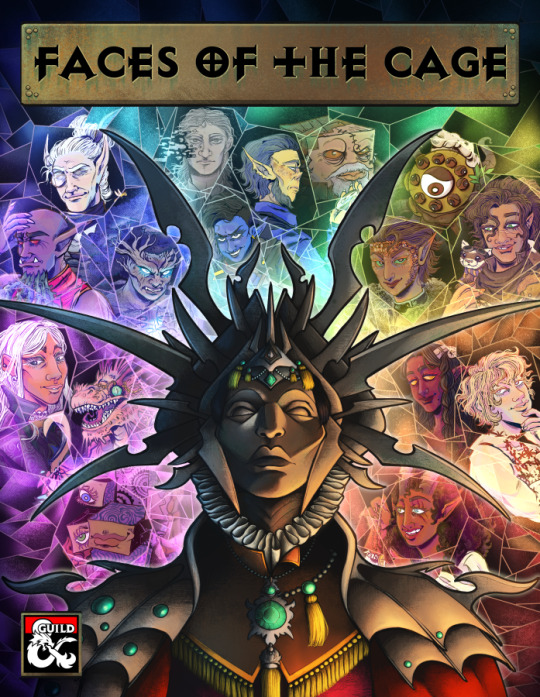
Out now on DMsGuild, which you can find here!
#dmsguild#dnd5e#dungeons and dragons#planescape#sigil#my art#hey i was the colead on this! did the full page arts and the lady of pain on the cover :3c#folio
26 notes
·
View notes
Text








The folks behind the Planar Compass deserve some big applause. This is the first issue (and its player companion), from 2020. It cunningly marries aspects of Spelljammer with Planescape to create something new and exciting and purple hued for Old-School Essentials, and it did it all two years before Wizards of the Coast thought to do something similar for 5E. Bully for them.
Beyond providing an indie-vibed alternative for corporate products, Planar Compass is pretty great on its own merits. This volume details the strange island of Dreamhaven in the Astral Sea, a place noted, of course, for its tavern. There are lots of NPCs, a handful of small adventures and explorations to take part in, and one central mystery that can potential change the island’s entire paradigm. It’s a well-populated sandbox.
It seems rather friendly, too. There’s danger, sure, that just comes naturally with D&Dish material, but there’s also a coziness. I find this to be true of all the Planar Compass material I’ve read. I tend to be a bit skeptical of pairing D&D with sentiments outside of mercenary murderhoboing, but Dreamhaven almost immediately conveys a home-iness that demands to be preserved. Characters are going to like it there, and they’re going to want to visit it again. There’s something about it (similar vibe to Orbital, actually, which I posted about back in April). Of course, that makes the stakes ultra-high, if, say, there were a way to accidentally blow up the whole island.
The zine also provides a lot of new mechanical material for OSE, new races, new classes and a whole psionic system, which I believe is a first. Subsequent volumes have significantly expanded on this, making Planar Compass one of the more substantial OSE settings.
71 notes
·
View notes
Note
Top 5 denizens of the Hells (from any setting)
Okay, besides me fawning over Raphael on @archcambion, I felt I should talk about my top five favorite loves of the Hells.
Thank you so much, @dujour13, for letting me info dump!
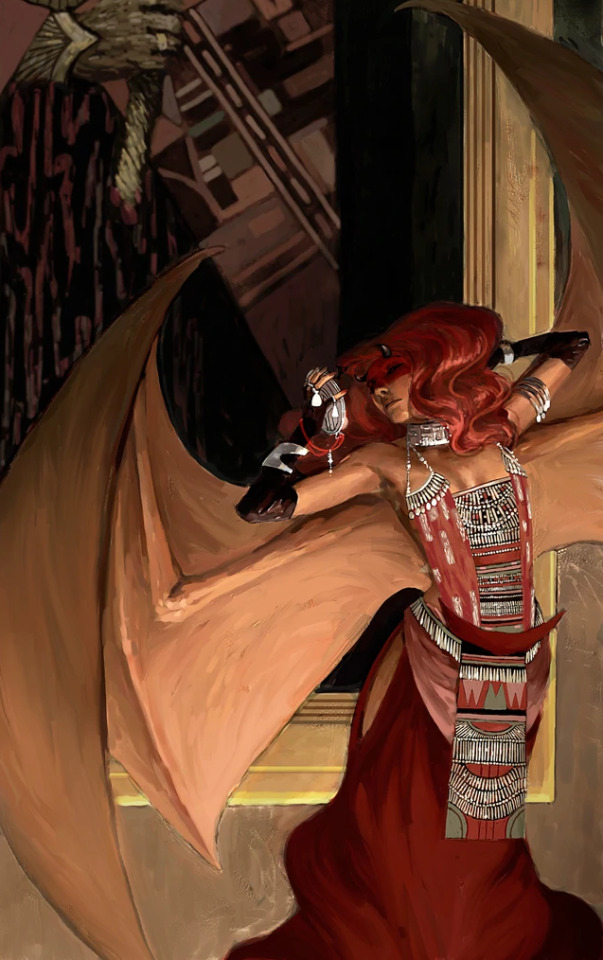

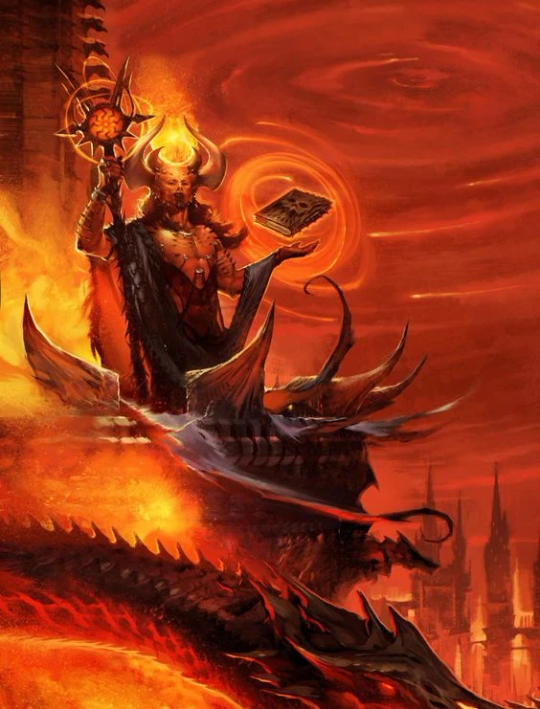
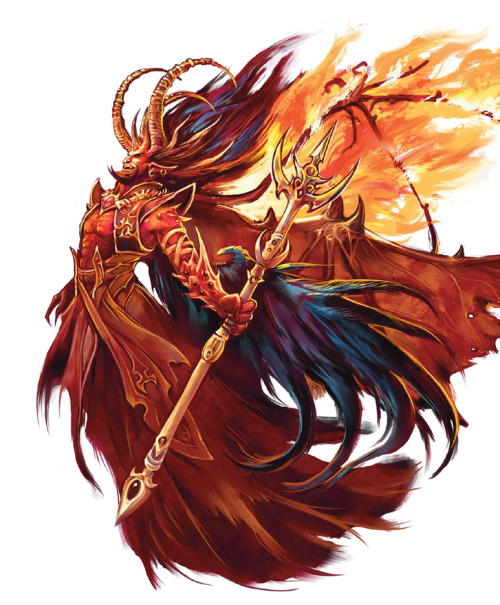
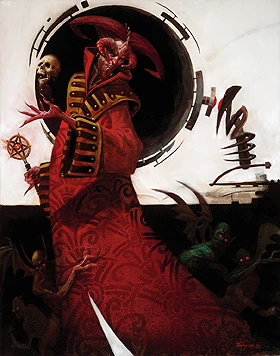
5. Glasya, the Archdevil of Malbolge (D&D)
The only child of Asmodeus, Glasya has always been in the side lines of D&D since it's inception, a bit of a minor player with she severing as a consort for an edition or two for Mammon. In late 2e and in 3.Xe, Glasya became such a political issue for Asmodeus, he bumped her to Archdevil to give her more work and to use in political maneuvering. Glasya still is the most chaotic of the Archdevils, focusing on her criminal empire within the Hells, and befriending her peer Fierna in a manner that suggest they were best friends.
4. Enecura, the Queen of Dis (PF)
The concept of Enecura bit me while learning more about the Archdevils in Pathfinder. This moral woman stole immorality from one of the most powerful gods in Pathfinder, got sent to hell, managed to thrive in this setting, and either fell in love or manipulated another demi-deity to fall in love with her. Not only does this woman have ovaries of steel, she and Dispater are a Hades and Persephone romance in disguise without any problematic tropes.
3. Dispater, Lord of Dis (PF)
I liked Dispater when I first read about him in D&D, but became less impressed with 5e lore of making him paranoid and yet easily manipulated. It wasn't so much the sexuality it suggested for Dispater as is making a feared Archdevil a little weak - though most Archdevils in D&D have more obvious flaws. When reading about PF, I liked this depiction of Dispater even more. I could see the bones of D&D's Dispater in the character, built into a logical way with unique details. A fast friend of Asmodeus, loyal and focused on law and order, he willingly fell with his wife to follow his leader. And during that fall, something happened to his wife. And no one knows what. Regardless, it brought out genuine puppy dog eyes from a design that is particularly kinky. His story with his son, the trouble second marriage, and the third marriage is also quite intresting. He might not have the 40 years of backstory as his counterpart, but what he has is amazing.
2. Mephistopheles, Lord of Cania (D&D and PF)
Mephistopheles is the one that got me really interested in DnD planar lore, leading me to Planescape Torment. When I was younger, my first DnD interest began with BG1 and it grew from there with BG2 and then Neverwinter Nights. Mephistopheles was an NPC Villain that caught my attention quicker than the game's intended villain and got me to reading more about him and his comrades. A Starcream with delusions of grandeur that he could almost back up, Mephistopheles was my favorite for a long time with a DnD campaign that brought his attention to me again. It was also around the time I was playing Pathfinder CRPGs, but I didn't get poking into that until he showed up, again, in WotR. Of course, Pathfinder Mephistopheles is very different from DnD Mephistopheles. The incarnation of Hell itself with a deeply loyalty to anyone that advances Hell cause, Mephistopheles beloved by Asmodeus, and Mephistopheles is very much his right hand person. He also has a gorgeous design that does take nods from his 3e depiction.
And oddly, a blend of both depictions with a unique twist of UST make Mephistopheles even more fun.
Asmodeus, Lord of Nessus, God of Indulgence (D&D)
Although I find myself favoring the Pathfinder takes of the Archdevils, this doesn't hold true to Asmodeus. Pathfinder Asmodeus is great, but the only advantage he might have over his D&D counterpart was always being a god, and yet he lacks the same prestige as D&D Asmodeus for that role. D&D Asmodeus has been apart of the brand since it's inception as the ruler of Hell through all the five editions, with the 2nd edition only using bare descriptions to indicate who he was when you couldn't use devils or demons in D&D. He has several origin stories inspired from Christianity and Zoroastrianism and he's gone through several crises, always rising on the top. I think that's why I love him a bit more than his counterpart. Asmodeus has scraped and crawled from being a devil to becoming a greater Deity if only due to 4e deciding it was about fucking time he become one. He's earned this status, you've seen how he's earned it, and while how they cement his godhood in Forgotten Realms is super dumb, he should be a God - he who is more crafty and chaotic than anyone realizes.
13 notes
·
View notes
Text
One thing I think is done extremely well in Baldur's Gate 3 (and in Larian's previous games, if I'm honest) is the way combat is treated as the carrot rather than the stick.
Most of the time, combat in CRPGs is the primary obstacle in the way of progression. You have to *get through* the combat in order to reach what really matters-- the dialogue and story. Too often, combat is coded as the "bad" outcome of a quest - you failed to persuade a key NPC and now you *have* to fight them. In Pillars of Eternity 2, if you pick too many fights, you can net yourself a reputation for being "cruel" or "aggressive", which can make it even harder to avoid fights in the future. In Planescape: Torment, every fight you get into has a chance of inadvertently making the endgame harder for yourself.
This seems all well and good from the story side of things. After all, killing people is generally bad, and you should be encouraged to find other ways out, right?
Baldur's Gate 3 takes a somewhat different approach. Sure, there are times when you'll accidentally trigger a fight with a whole faction of friendly NPCs and will immediately reload in a panic, but for the most part, the game doesn't make you feel bad for killing people. In fact, it makes you *look forward* to combat in a way that most other games don't, because the combat in Baldur's Gate 3 is so damn fun.
And why should a game want to make you feel bad for engaging with its primary and most in-depth mechanic? In many cases, choosing to fight leads you to a better outcome than the so-called "peaceful" option. Some of the best fights in the game are entirely optional, and yet you are compelled to engage with them because the fight itself is the reward.
This is I think, the best possible way to bring the feel of tabletop gaming to the CRPG medium. Because combat shouldn't be just a stopgap between your party and the next dialogue check to pass, and I'm eternally grateful that Baldur's Gate 3 lets you have so much fun with it.
#game design#baldur's gate 3#bg3#pillars of eternity#planescape#crpg#rpgs#larian studios#dnd5e#my thoughts
28 notes
·
View notes